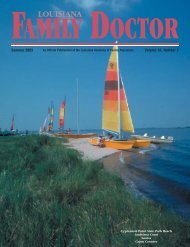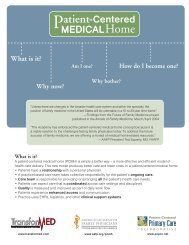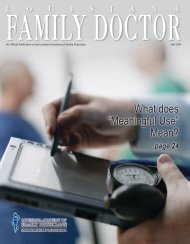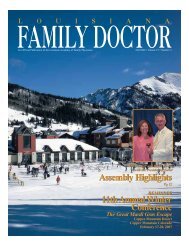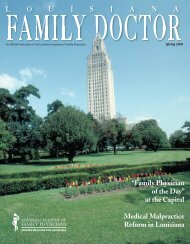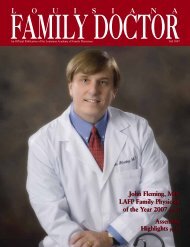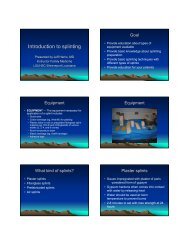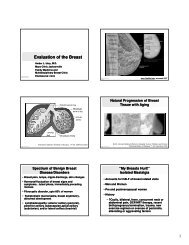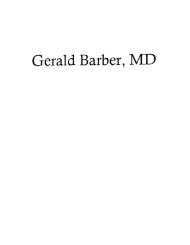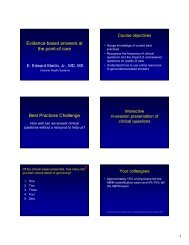New Drug Update 2009-2010 - LAFP
New Drug Update 2009-2010 - LAFP
New Drug Update 2009-2010 - LAFP
Create successful ePaper yourself
Turn your PDF publications into a flip-book with our unique Google optimized e-Paper software.
about PCV2, a contaminant in RotaTeq. Gordon Allan, PhD, a professor at The Queens University Belfast<br />
in Belfast, Northern Ireland, rang an alarm bell with what resembled a passing remark about how the virus<br />
triggers postweaning multisystemic wasting syndrome.<br />
"PCV2 in a lot of ways is a strange virus," Dr. Allan said. To get "good disease in pigs with PCV2," one<br />
must infect them with the virus and then stimulate their immune system, either by reinfecting them with<br />
the virus or vaccinating them. He raised the possibility of this chain of events occurring with sequential<br />
doses of rotavirus vaccine.<br />
May 14, <strong>2010</strong> FDA Revises Recommendations for Rotavirus Vaccines<br />
The U.S. Food and <strong>Drug</strong> Administration today revised its recommendations for rotavirus vaccines for the<br />
prevention of the disease in infants and has determined that it is appropriate for clinicians and health care<br />
professionals to resume the use of Rotarix and to continue the use of RotaTeq.<br />
The agency reached its decision based on a careful evaluation of information from laboratory results from<br />
the manufacturers and the FDA’s own laboratories, a thorough review of the scientific literature, and input<br />
from scientific and public health experts, including members of the FDA’s Vaccines and Related<br />
Biological Products Advisory Committee that convened on May 7, <strong>2010</strong> to discuss these vaccines.<br />
The FDA also considered the following in its decision:<br />
• Both vaccines have strong safety records, including clinical trials involving tens of thousands of<br />
patients as well as clinical experience with millions of vaccine recipients.<br />
• The FDA has no evidence that PCV1 or PCV2 pose a safety risk in humans, and neither is known<br />
to cause infection or illness in humans.<br />
• The benefits of the vaccines are substantial, and include prevention of death in some parts of the<br />
world and hospitalization for severe rotavirus disease in the United States. These benefits<br />
outweigh the risk, which is theoretical.<br />
March 28, <strong>2010</strong> FDA warns that of the 4 million prescriptions for nitroglycerine tablets sold in the<br />
US last year, that most were not FDA approved nor was their safety or effectivenss vetted by the<br />
FDA.<br />
The FDA notified the two major unapproved manufacturers Glenmark Generics and Kronec tthat they had<br />
not meet the rules of the FDA and that they should discontinue manufacturing in the nest 90 days and<br />
marketing of these unapproved nitroglycerine tablets in the next 6 months. The companies said that they<br />
would comply but they took issue with the FDA saying that these products were pre 1938 FDA regulations<br />
and thus grandfathered and not required for FDA review. The FDA has not evaluated these products but<br />
they are NOT FDA approved and thus we are ordering them off the market. Pfizer’s Nitrostat is the only<br />
FDA approved nitroglycerine tablet and it is priced slightly above the other two $21.99 vs. $19.99<br />
May <strong>2010</strong> FDA Action against Johnson and Johnson and McNeil Consumer Healthcare<br />
Ingredients used by Johnson & Johnson in some of the 40 varieties of children's cold medicines recalled<br />
last week were contaminated with bacteria, according to a report by the Food and <strong>Drug</strong> Administration.<br />
Agency officials said Tuesday none of the company's finished products tested positive for the<br />
contaminants, though such testing is not definitive. "We think the risk to consumers at this point is<br />
remote," said Deborah Autor, director of FDA's drug compliance office. The FDA report, which was posted<br />
online, lists more than 20 manufacturing problems found at the McNeil Consumer Healthcare plant in Fort<br />
Washington, Pa., where the formulas were made. The recalled products include children and infant<br />
formulations of Tylenol, Motrin, Zyrtec and Benadryl. FDA inspectors visited the plant in mid-April and<br />
wrapped up their inspection Friday. J&J issued its "voluntary" recall later that night. Among other<br />
problems, FDA inspectors said the company did not have laboratory facilities to test drug ingredients and<br />
failed to follow up on customer complaints. J&J did not investigate more than 46 complaints received in<br />
the last year about "black or dark specks" in Tylenol products, according to the FDA's report. Additionally,<br />
inspectors found some pieces of equipment covered with thick layers of dust, while others were held<br />
together with duct tape. In a statement Tuesday, J&J called the problems cited by the FDA "unacceptable<br />
to us, and not indicative of how McNeil Consumer Healthcare intends to operate." The FDA reiterated that<br />
serious medical problems with the products are unlikely, but advised consumers to stop using the<br />
medicine as a precaution. Parents are instructed to use generic alternatives instead. J&J has said some<br />
of the recalled medicines may have a higher concentration of the active ingredient than listed on the<br />
bottle. Others may contain particles, while still others may contain inactive ingredients that do not meet<br />
testing requirements. "That warning letter brought us to the point where we thought it was necessary to sit<br />
down with management and discuss our concerns," Autor said. FDA officials said they are considering<br />
taking additional action against J&J, ranging from issuing more warning letters to pursuing criminal action.<br />
15



